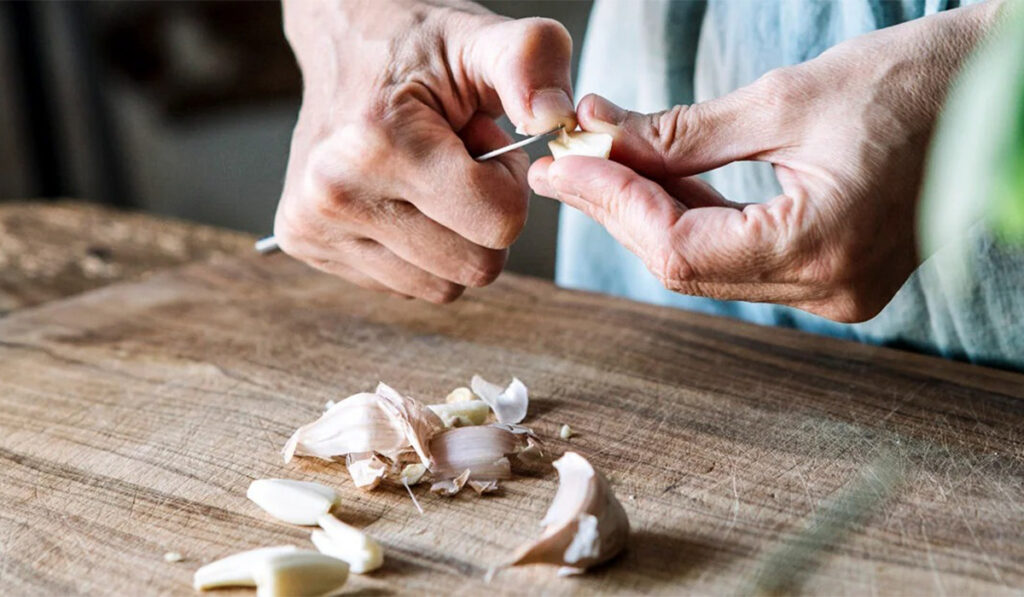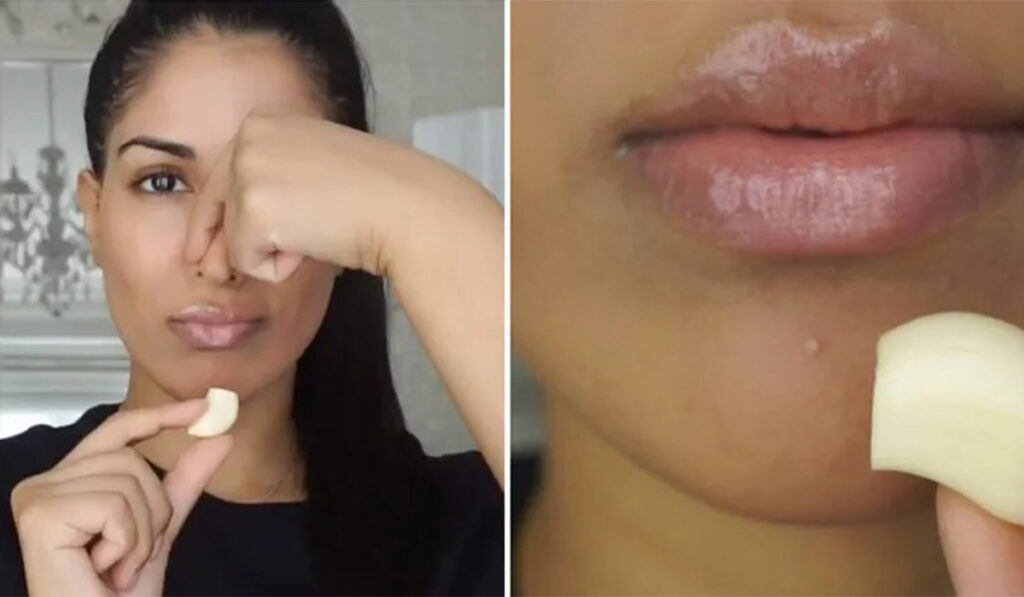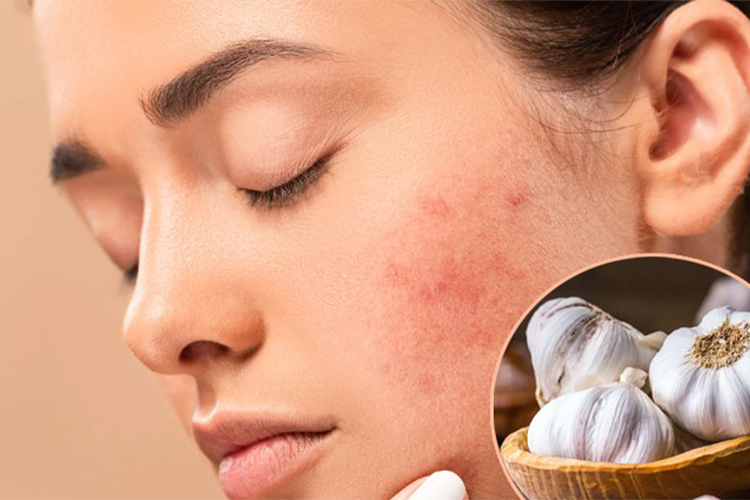
Does Garlic Help With Acne? What does science say?
Different things you find in your kitchen can be used to treat different ailments, from skin problems to respiratory diseases. Garlic is one such ingredient believed to treat many skin conditions. Not only can you add it to your healthy eating plan, but you can also use it as an alternative medicine at home for acne problems. But does it really work? What are the benefits of garlic for your skin? Read on to find out what the science says about garlic’s skin benefits and how it can help minimize acne.

1. Garlic puree
This simple home remedy acts as a herbal medicine and is believed to be effective due to the antibacterial properties of garlic. Raw garlic can also be used, although a diluted version is gentler on the skin. For the best results, you can use this remedy three times a week.
you will need
3 to 4 cloves of garlic
1 tablespoon of water
Proceedings
Crush the garlic cloves.
Add water to get a thick puree.
Apply the mixture to the affected area.
Leave it on for 10 minutes.
Flush with water.
Pat dry.
Apply a moisturizer.
2. Garlic and yogurt
Yogurt contains probiotics that may help treat acne (3). It is believed that yogurt can also clear clogged pores and dead skin cells that could otherwise lead to acne. Incorporate this into your skincare routine every other day for clear, flawless skin.
you will need
2 to 3 cloves of garlic
1 tablespoon yogurt
Proceedings
Grind the garlic cloves and yoghurt into a fine paste.
Apply this mixture to the acne prone area.
Rinse with warm water after 15 minutes.
3. Garlic and Rosewater
Rose water has a calming effect and is gentle on acne-prone skin. Rose water and plant extracts are said to be effective against acne due to their antibacterial properties (4).
you will need
3 cloves of garlic
1 tablespoon rose water
Proceedings
Crush the garlic cloves and add rose water until a thick paste forms.
Apply this mixture to the affected area.
Do not leave it on for more than 10 minutes. Rinse with lukewarm water.
Pat dry and then apply a moisturizer.
4. Garlic and Aloe Vera
This natural remedy is applied topically to the skin. It can be helpful in preventing future outbreaks (5). In addition to moisturizing the skin, aloe vera also has an anti-acne effect (6). This home remedy is perfect for people with sensitive skin.
you will need
2 tablespoons garlic juice
2 tablespoons of aloe vera
Proceedings
Add aloe vera to the garlic juice.
Apply this to the acne prone area.
Rinse after 15 minutes

5. Garlic and honey
Honey is a natural humectant and has antimicrobial properties (7). This remedy is perfect for people with dry skin. You should only use this once a week.
you will need
2 to 3 cloves of garlic
1 tablespoon of water
1 tablespoon of honey
Proceedings
Crush the garlic cloves and dilute the mixture with water.
Take equal amounts of garlic water mixture and honey.
Mix them thoroughly and dab the solution onto your pimples or acne scars.
Wash after 10 to 15 minutes.
6. Garlic and ACV
Apple cider vinegar has antimicrobial properties that can help treat acne-prone skin (8). However, remember to apply diluted ACV to the skin. Undiluted ACV may be too strong for your skin.
you will need
3 cloves of garlic
2 tablespoons diluted apple cider vinegar
Proceedings
Grind the garlic cloves with ACV.
Strain the mixture with cheesecloth.
Apply a thin layer of this solution to your acne.
Leave to dry for 10 minutes.
Flush with water.
Anecdotal evidence suggests that drinking garlic water or raw garlic juice can also help clear acne. However, keep in mind that eating too much garlic comes with its own risks.

Precautions to be taken
Garlic is naturally very strong and may cause a slight burning or stinging sensation when applied directly to the skin. It is recommended to be diluted with water or other ingredients before topical application. Consult a doctor if you experience the following symptoms after using garlic:
redness
swelling
Persistent tingling or burning sensation
Allergic reaction, skin irritation or rash
Garlic is known to interact with various medicines and medications (see below) (9). Keep this in mind before taking any garlic-based home remedies.
warfarin
platelet aggregation inhibitors
saquinavir
antihypertensive drugs
calcium channel blockers
Quinolone antibiotics such as ciprofloxacin and blood sugar lowering drugs
In summary, while garlic is widely recognized as potentially beneficial for treating acne due to its antibacterial and anti-inflammatory properties, scientific evidence supporting its effectiveness is limited. Many of the claims regarding garlic’s effectiveness in treating acne are based on anecdotal evidence and traditional medicine rather than rigorous scientific studies.
Using garlic as a topical remedy for acne should be done with caution as raw garlic can irritate the skin. It is important to dilute garlic with water or other ingredients before applying it to the skin and to discontinue use if side effects occur.
For those who want an effective acne treatment, it is recommended to consult a dermatologist. They can provide evidence-based advice and recommend appropriate treatments tailored to individual skin conditions. Although natural remedies like garlic may have some potential benefits, they should be used in conjunction with proven acne treatments for best results.
Overall, more research is needed to fully understand the extent of garlic’s effectiveness in treating acne. In the meantime, it’s best to rely on dermatologist-approved treatments to treat acne and maintain skin health.

